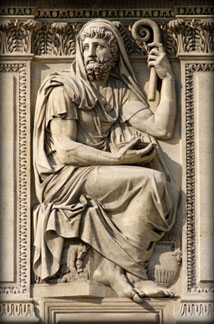Herodotus, the Father of History
 History is the study of or a record of past events considered
together, especially events of a particular period, country or subject.
Sri Lankans have a right to boast of a 2,000-year-old history. The
Mahavamsa records the beginnings of our history and its gradual
expansion to the present period. History is the study of or a record of past events considered
together, especially events of a particular period, country or subject.
Sri Lankans have a right to boast of a 2,000-year-old history. The
Mahavamsa records the beginnings of our history and its gradual
expansion to the present period.
History was taught as a subject in schools and universities from time
immemorial. However, at one stage, history was scrapped along with
literature from the school syllabus. The rulers at that time would have
thought that history was a useless subject. As a result a generation of
students did not learn history. However, times have changed. Today
history is taught in schools and universities. Education Minister
Bandula Gunawardena is reported to have said that he would make history
a compulsory subject. This is a healthy sign that history is to be been
given its pride of place.
Elegance
Some of the history students may not know that Herodotus (c. 484 -
408 BC) was the Father of History. “Herodotus,” says Lempriere, “is
among the historians what Homer is among the poets and Demosthenes among
the orators of ancient times. His style abounds with elegance, ease and
sweetness...” While Homer was the first and greatest of the poets, so
Herodotus was the first and fountain-head of prose writers. No one has
questioned the title “the Father of History” which Cicero bestowed upon
Herodotus. If we go a step further, we can say that Herodotus was also
the Father of European Prose.
|

Herodotus |
It is ironical that the man who wrote “things which have happened may
not perish” has not left his own life history. As a result, we know very
little about the life and times of Herodotus. Perhaps he is one of those
misty figures unknown to historians.
According to information, Herodotus was born at Halicarnassus in the
south-west of Asia Minor around 484 BC. At the time of his birth,
Halicarnassus was ruled by Artemisia, the warrior queen. When Herodotus
was a young man, Artemisia’s grandson Lygdamis, was the tyrant of the
city under Artaxerxes, the king of Persia which is known as Iran today.
Inspired by the spirit of Greek sense of freedom, Herodotus joined
the revolutionary party to overthrow the Persian king. The party was led
by Herodotus’s uncle Panyasis. However, Panyasis was captured by the
king’s men and was was executed. Feeling that he was not safe to live
there, Herodotus fled to Samos. Thereafter he started writing history in
exile.
Tyrant
When the tyrant was overthrown, Herodotus returned to his motherland.
However, to his surprise, he found that the new party in power too was
hostile to him. This forced him to leave Halicarnassus for good. Then he
led a life wandering in different countries. After some time, Herodotus
made Athens his second home. At the time, Athens was a flourishing
democracy and it was considered the cultural centre of the world.
Herodotus had cordial relations with the great dramatist Sophocles.
Herodotus read his histories in public and the people were delighted to
hear them. What is more, as a reward, he was given a grant from the
public funds. His public readings of histories at Olympic games received
wide applause. However, instead of resting on his laurels, Herodotus
continued to travel extensively.
His experience as a great traveller enabled him to give people an
authentic description of what was happening in the countries he visited.
He went up the Nile into upper Egypt and travelled to Babylon and
Persia. He sailed across the Black Sea and visited Crimea and the land
of Colchis. He also travelled the length and breadth of Greece. Unlike
modern historians who do desk research in modern libraries, Herodotus
collected first-hand information for his histories.
Death
When Athenians established a new colony in the south of Italy, they
founded the town Thurii. It attracted many Athenians including the great
orator Syracusan an historian Herodotus. At the time of his death,
Herodotus was in Athens. He could not, however, complete his monumental
histories.
Those who have a passion for history will always remember Herodotus
as an unusual historian who preferred to be in places where history was
being made. He travelled to many countries, spoke to the people and
gathered information. He also visited places where battles were raging.
He wanted to record what he actually saw with his own eyes and what he
heard.
Herodotus has his own detractors. They have criticised him for his
rambling stories and inaccuracies. He also believed in divine
intervention, something modern historians laugh at.
With all such inaccuracies and limitations, Herodotus compiled the
first book of history popularly known as the Histories. Therefore, he
deserves the sobriquet the Father of History. |

